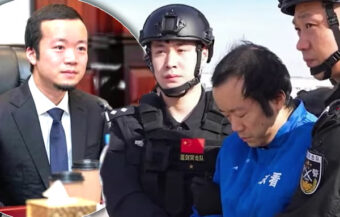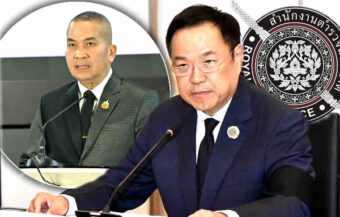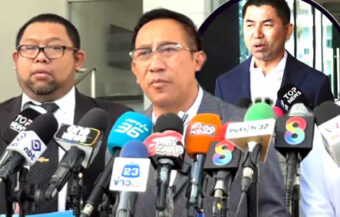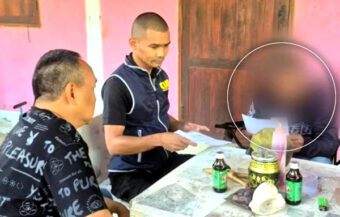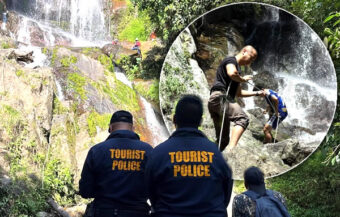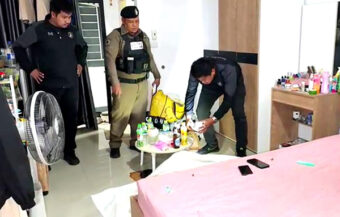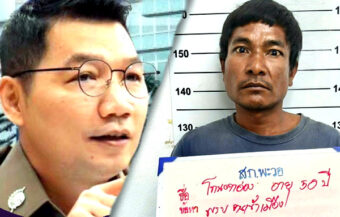Bhumjaithai Party exploits Senate control to block Pheu Thai and limit People’s Party influence, threatening meaningful constitutional reform, shaping the 2026 election, as ongoing investigations and political manoeuvring favour elite power consolidation.
The Senate, controversially elected, now controls Thailand’s constitutional reform agenda ahead of the 2026 election. Last week, it rejected the Pheu Thai Party’s widely praised draft, signalling it may also block the People’s Party version at the second or third reading. Meanwhile, the Department of Special Investigation (DSI) questions witness testimony in its 2024 Senate election probe, and the Election Commission has yet to act on 229 names, including Prime Minister Anutin Charnvirakul, passed on by a committee recommending prosecution. Critics warn the MOU between the People’s Party and Bhumjaithai may yet cement an even more restrictive constitution while undermining pro-democracy parties before the next poll.
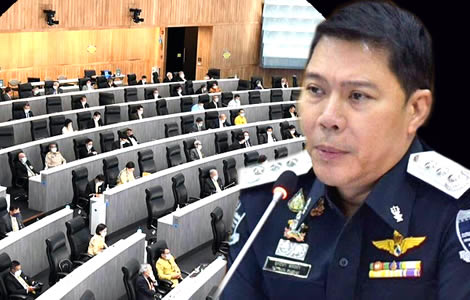
Last week, Deputy Prime Minister Bowornsak Uwanno tentatively set March 29, 2026, as the date for the General Election.
Meanwhile, the interim government, the People’s Party, and the Pheu Thai Party are working to navigate constitutional drafting legislation through parliament. Significantly, the process is controlled entirely by the Senate, which has emerged as a key political battleground.
At the same time, the Senate is shrouded in controversy. The election of 138 senators linked to the Bhumjaithai Party is reportedly under investigation by both the Election Commission and the Department of Special Investigation, or DSI. One investigation is legal in nature and could result in a referral to the Constitutional Court. Simultaneously, the criminal investigation is examining money laundering and the operation of a secret society.
Election Commission probe drags as DSI faces weak evidence, witness resistance and mounting pressure
Currently, the Election Commission probe remains in a preliminary stage. It has yet to reach the formal decision-making phase on whether the Constitutional Court should intervene.
Meanwhile, the DSI has questioned 1,200 witnesses in connection with alleged collusion and money laundering, but testimony has yielded minimal results. Many witnesses provided unhelpful statements, while Buriram witnesses have been notably uncooperative.
Pol. Lt. Col. Yutthana Praedam, Director-General of the DSI, emphasised that clear evidence is essential in this criminal case. Investigators are tracing financial transactions and plan to meet with prosecutors soon. If the money transfers are determined to be criminal proceeds, legal action will follow. However, no formal meeting with prosecutors has occurred.
Regarding uncooperative witnesses, Pol. Lt. Col. Yutthana stated that additional consultations with prosecutors are required. Meanwhile, investigators continue to assess whether legal proceedings can be initiated against those resisting summonses in Buriram. Furthermore, the challenges with witness testimony have slowed progress on the broader investigation.
Khao Kradong land case stagnates as legal time limits and political links threaten accountability in Buriram
In addition, the Khao Kradong land dispute case has seen no substantial progress. This case involves alleged land encroachment in Samet and Isan subdistricts in Buriram Province, connected to key figures in the Bhumjaithai Party.
Currently, it has not been accepted as a special case, though preliminary inquiries are ongoing. Authorities are assessing whether any wrongdoing occurred, while the statute of limitations threatens to expire on decades-old allegations.
Preliminary findings indicate that title deeds were issued many years ago, which complicates potential prosecution. Investigators are gathering additional evidence and coordinating with relevant agencies to determine whether officials acted improperly. However, as yet, the case remains stagnant, raising concerns about accountability.
Earlier this week, the Senate rejected the Pheu Thai Party’s draft for a new constitution. This plan had received strong academic praise for proposing a 180-day timeline and allowing extensive public input.
Senate approval of People’s Party and Bhumjaithai drafts points to an extended timeline and limited public role
The final decision on drafters would have been determined by the parliament after public referral. Instead, the Senate approved constitutional drafts from the People’s Party and the Bhumjaithai Party.
Analysts note that the rejection of Pheu Thai’s draft suggests the Senate is prioritising political control over efficiency. As a result, the constitutional amendment process is likely to be prolonged. Depending on the People’s Party and Bhumjaithai Party drafts, the timeline could extend to 270 or even 360 days. This contrasts sharply with historical evidence that shows constitutional drafting can be completed faster using prior research and committee work.
Public participation is central to the debate. The People’s Party’s draft emphasises indirect public selection of Constituent Assembly members. Both the Assembly and advisory councils could have been directly chosen by citizens. However, legal risks remain high, since the Constitutional Court prohibits direct election of Assembly members.
Bhumjaithai draft mirrors Senate, reduces public input, and risks consolidating elite control over the process
In contrast, the Bhumjaithai Party draft mirrors the Senate’s structure, allowing only one provincial representative to vote. This design effectively eliminates public participation but minimises legal challenges. Meanwhile, the Pheu Thai Party proposed a compromise, suggesting 300 indirectly elected public participants and parliamentary selection of 100 more. This practical and representative compromise was rejected by the Senate this week.
Observers warn that the Senate appears determined to prioritise the Bhumjaithai Party’s draft. If fewer than 66 senators approve in the third reading, any amendment could fail entirely. Critics argue that the current 2017 Constitution grants senators extraordinary powers, discouraging reforms that might reduce their influence.
Many experts stress the danger of piecemeal amendments. For example, selective changes to Section 160, concerning honesty and integrity, previously triggered two prime ministerial changes. Similarly, electoral reforms or party-list adjustments could occur without improving citizens’ rights, freedoms, or political accountability.
Senate dominance may ensure Bhumjaithai draft prevails regardless of election outcome or public opinion
In short, a more problematic constitution may yet arise from the process driven by the Bhumjaithai Party.
The political manoeuvring is clear. MPs from all factions debated actively, including members of the Democrat Party. However, senators frequently used harsh language to resist constitutional change.
Analysts suggest that the upper house prioritised the Bhumjaithai Party draft to preserve established power structures. Consequently, the Senate may effectively decide the outcome of constitutional revisions regardless.
Procedural agreements, or MOAs, between political parties such as Bhumjaithai and the People’s Party are not binding on senators. Therefore, senators retain the right to vote independently in the crucial third reading. Observers highlight this as a systemic problem: even a capable prime minister may serve only a short term if the Senate remains uncooperative. Party majorities no longer guarantee stability or influence.
Constitutional referendum risks rise with complex ballot questions and voter confusion ahead of ballot
The constitutional debate is intertwined with electoral strategy. Analysts warn that a referendum held concurrently with parliamentary elections carries enormous risks. Public understanding of complex constitutional issues is limited. Meanwhile, vote-buying or manipulation, such as nationalist rhetoric, may influence outcomes.
It is, for instance, likely that a referendum on Memorandums of Understanding (MOUs) 43 and 44 in relation to Cambodia may be on the ballot. This would mean six ballot questions: constituency election, party list, two for the constitution, and two for the Cambodia MOUs.
This is neither healthy nor politically sensible for the pro-democracy parties, who consistently have shown 65% support between them in National Institute of Development Administration (NIDA) opinion polls.
The draft constitution is expected to be completed within approximately six months, aligning with the General Election. However, there are increasingly loud murmurs suggesting doubt. Any delay or suspension of the process would, in effect, jeopardise the Bhumjaithai Party’s political advantage.
Delay in amendment risks undermining opposition and consolidating interim government’s control
If amendments are not finalised before parliament dissolves, the party risks losing influence in shaping the next government. Meanwhile, attempts by Pheu Thai and the People’s Party to unite for constitutional amendments have faced significant obstacles.
The danger is that the constitutional amendments process may allow the interim government to extend its tenure. In effect, it becomes a carrot dangled before the noses of People’s Party MPs. Ultimately, however, the Senate controls the process and outcome. Either it may shut down a People’s Party formula eventually, or it may be passed and later challenged by the Constitutional Court.
There are already concerns among senior politicians that the People’s Party has erred by electing Prime Minister Anutin Charnvirakul as Prime Minister.
The fear is that this error may be exploited, delivering even greater advantage to the Bhumjaithai Party, which only polled 3% in the 2023 party-list vote.
Political analysts also warn of a broader struggle for control. The debate exposes a strategic game being played between Pheu Thai, Bhumjaithai, and older political networks allied with the Senate.
Observing votes, it is clear that many senators engaged with the Pheu Thai draft but ultimately voted against it. This has isolated Pheu Thai. This highlights the deep tactical manoeuvring that is presently shaping Thai politics.
Bhumjaithai draft secures elite control while People’s Party draft risks legal challenges and reduced influence
The Bhumjaithai Party draft aligns closely with Constitutional Court rulings. It allows Parliament to select Constituent Assembly members. Citizens may apply, but the process remains dominated by parliamentary and senatorial influence. Analysts argue this preserves the elite’s ability to control constitutional outcomes.
Observers caution that the Senate should not control the draft of regulations for the wider Assembly. Any rules drafted should ultimately face public scrutiny. Nevertheless, a referendum, if passed, would legitimise the process as a majority decision, artificially tweaked out of this distorted parliamentary process.
The People’s Party draft offered a more liberal approach, promoting public participation and challenging entrenched power networks.
Experts argue that the 1997 Constitution demonstrates the risks of ineffective constitutional drafting. By contrast, the Bhumjaithai Party draft exploits existing parliamentary and senatorial mechanisms to secure control.
Referendums alongside parliamentary elections risk voter confusion, indirect vote buying, and stalled reforms
Referendums held alongside parliamentary elections are especially risky. Confusion among voters could prevent the draft from passing. Moreover, the draft may require further revisions to address social and economic issues. Public engagement remains limited, and parties have not explained the implications for citizens’ livelihoods.
Indirect vote-buying is expected to influence the upcoming election. Complex strategic manoeuvres, including indirect pressure on voters, may impact the constitutional referendum’s outcome. Should the referendum fail, the government would continue under the current constitution without substantive reform.
Analysts stress that completing the draft within six months is critical. Delays could disrupt parliamentary procedures, the election, and political balance. Failure to amend the constitution would preserve the status quo, benefiting established parties while limiting meaningful public participation.
Aborting the amendment process could be a real opportunity as Senate dominance blocks opposition
An option that may be considered is aborting the process and campaigning for real constitutional change. This, of course, is the danger of what the People’s Party signed up to in early September. It is now indeed precluded from adopting this politically sensible strategy.
Furthermore, there is a real risk of a less satisfactory constitutional amendment emerging from this, given the distorted power of a confident Senate controlled by the Bhumjaithai Party.
The constitutional amendment process highlights serious systemic challenges in Thai politics. Even active debates may not overcome entrenched senatorial priorities. Partial amendments risk failing to address governance, representation, and accountability issues.
Ongoing investigations, political manoeuvring and Senate control are certainly shaping the pre-election environment.
Cases and constitutional amendments could determine next government’s makeup or be quietly shelved
The outcomes of criminal cases, including money laundering and the Khao Kradong land dispute, alongside constitutional amendments, could impact the composition and authority of the next government. Or they may simply be shelved or quietly ditched.
However, things look like they are constantly breaking in favour of the Bhumjaithai Party.
2024 Senate election enquiries into collusion are a problem for new Prime Minister Anutin Charnvirakul
Thailand enters a new wave of Political Ga Ga as the interim government stokes nationalist sentiment to gain power
Observers warn that the Bhumjaithai Party, controlling the Ministry of the Interior through Prime Minister Anutin Charnvirakul, may leverage institutional power to shape electoral outcomes. Moves such as relocating senior officials have raised concerns over administrative impartiality.
Overall, the political landscape ahead of the 2026 General Election is defined by strategic positioning, high-stakes investigations, and a complex constitutional amendment process. A divided opposition of the People’s Party and the Pheu Thai Party continues playing into the Bhumjaithai Party’s hands.
Join the Thai News forum, follow Thai Examiner on Facebook here
Receive all our stories as they come out on Telegram here
Follow Thai Examiner here
Further reading:
Steely new line being taken as Thailand toughens its Cambodian border posture. Families ordered out
PM confirms government’s referendum plan to scrap MOUs with Cambodia. Top People’s Party MP shocked
Leader of deadly scam gang in Cambodia and henchmen still at large with 4 more Thais arrested
Police in Cambodia close in on fake scam loan app leadership after family murders in Samut Prakan
Cambodian cybercrime industry run by Chinese criminals could be generating up to 38% of its GDP
Debt and ฿1.7 million loss to scammers drive man to murder his wife and two sons in Samut Prakan
Loan shark arrested in Nonthaburi for bullying a borrower charged an annual interest rate of 730%





